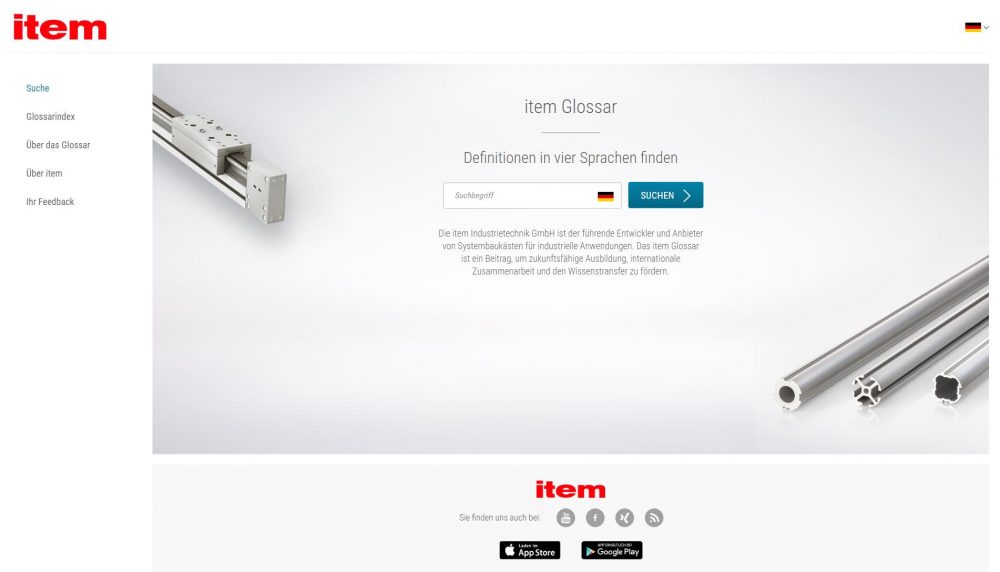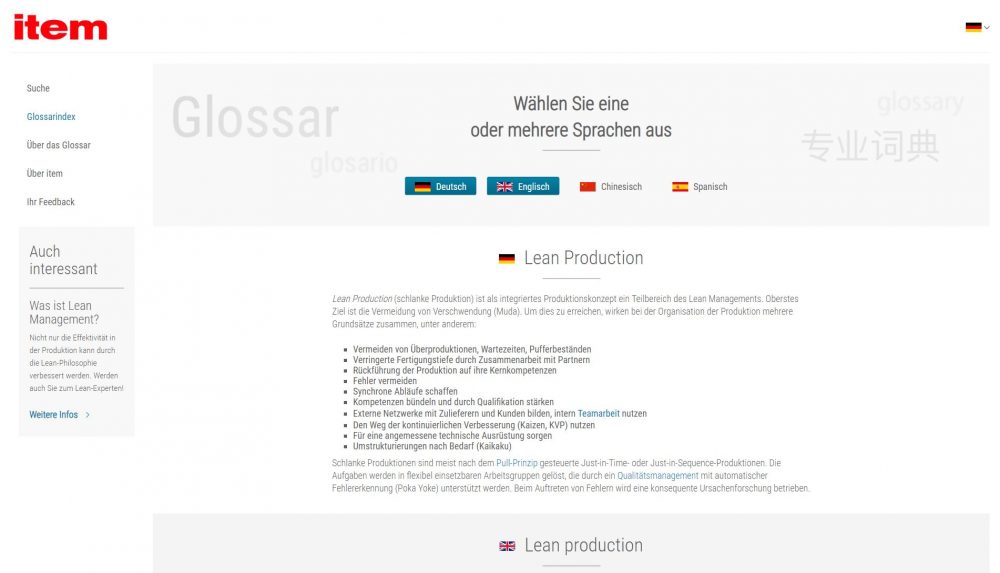The world of mechanical engineering is as fascinating as it is complex, and students of the subject find themselves facing countless technical terms, models and concepts. Thankfully, that is precisely where the item Glossary can help.
The item Glossary has been developed as a database of knowledge in German and English that clarifies carefully selected specialist mechanical engineering terminology. It is aimed primarily at mechanical engineering students who work with specialist texts in English and German and provides a fast, user-friendly point of reference when looking for the right technical term. Example sentences to match the dictionary entries have also been compiled in both languages. Some of the entries feature labelled graphics that are naturally provided in both German and English. This knowledge database for mechanical engineering students – and anyone else who might be interested – has been up and running since summer semester 2014.
Claims and objectives
Of course, to use a technical term correctly, you need more than just a direct translation. That is why we have also incorporated close to 20,000 example sentences into the system as an extra service. Since these sentences are based on all the item documents that have been translated, they are not vague theoretical reflections, but rather direct examples from day-to-day scenarios in mechanical engineering. That way, users can always benefit from the surrounding context in which the terms are being used.
The item Glossary is designed to be widely available to anyone, anywhere, free of charge – and that is why it has been developed for the web and as a smartphone app (Android and iOS). Whether looking something up quickly when meeting with your study group or preparing on your way into uni on the train, this flexibility fits perfectly into everyday student life. As this is the first resource of its type on the market, we are happy to lead the way.

Starting gun for the item Glossary
It was not just the subject that made it imperative to adopt a systematic approach. We started by selecting a list of keywords and technical terms from the topic areas that all mechanical engineering students are expected to master as they begin their studies – mechanics, engineering, manufacturing processes, material strength, materials science. We then looked at which specific topics required more detailed explanations. So far, 860 detailed explanations have been added to the glossary, with a further 140 prepared and awaiting translation.
When the idea for the item Glossary was first developed, it quickly became clear that we would have to involve external authors – particularly in view of the ambitious aim and scope of the project and the necessary illustrations. The next step was to find a faculty that could act as an authority and provide quality assurance every step of the way. We were extremely happy when Prof. Dr.-Ing. habil. Dr. h. c. Heinrich Kern from Technische Universität Ilmenau agreed to help. As the head of the Department for Metallic and Composite Materials, he was only too pleased to provide specialist support.

Great feedback from students and the outlook for the future
At the end of 2014, just under half a year after the item Glossary was launched, we conducted an acceptance study at 68 universities in Germany and Austria. The results were unanimously positive. The issues evaluated in the study included ease of use and display features. Here are some direct quotes from students who took part in the study: “It’s all self-explanatory. Super!”, “It’s a super dictionary – finally I don’t have to spend ages searching for a translation” and “Very clear. The function that suggests search terms is very helpful. You can see everything in one place.”
But there is still work to be done on the item Glossary. There are plans to integrate more detailed links to further improve user-friendliness. Once the thousand mark has been reached for the detailed glossary entries and links have been optimised, we’ll be taking another close look at the glossary to work out whether we can add to the entries and how best to go about doing that.
We will soon be publishing more articles about our activities in the higher education sector. All you need to do to make sure you don’t miss out on any updates is subscribe to the item blog.



